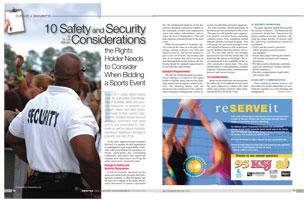
 In post 9/11 world, rights holders must be adequately knowledgeable of available safety and security measures to prepare for, prevent, detect, and deter potential threats to their events. Catastrophic incidents should serve as constant reminders that sport events are vulnerable to man-made as well as natural incidents, resulting in significant damage to property and loss of life. As the sport organizers begin to prepare their bid, it is prudent for that organization to understand its legal responsibility to provide a safe environment for spectators, officials, participants, and surrounding community, and realize that significant changes have taken place involving the safety and security of special events.
In post 9/11 world, rights holders must be adequately knowledgeable of available safety and security measures to prepare for, prevent, detect, and deter potential threats to their events. Catastrophic incidents should serve as constant reminders that sport events are vulnerable to man-made as well as natural incidents, resulting in significant damage to property and loss of life. As the sport organizers begin to prepare their bid, it is prudent for that organization to understand its legal responsibility to provide a safe environment for spectators, officials, participants, and surrounding community, and realize that significant changes have taken place involving the safety and security of special events.
Engage in Safety and Security Discussions
It will be critically important for the sports governing body, privately held management company or other bid agency and the host city to engage in the safety and security discussions to assure a successful bid. The fundamental platform of the discussions should be centered on whether or not reasonable systems were employed to assess risk, reduce vulnerabilities, and increase the level of preparedness. This will help minimize potential threats to the sport event.
While the principles of securing a special event are the same as in the past, technology, training methods, city, state and federal resources, and lessons learned require a new set of safety and security skill sets. As we realize that each event has its own distinguished security features, the following should be standard requirement to be provided the rights holder.
Standard Requirements
The bid city should designate an experienced employee as liaison to the rights holder to lead the safety and security planning matters and emergency-related activities. The planning begins with the advanced team comprised of law enforcement, emergency management, facility directors, fire/HazMat, and event organizers. The team members should participate in the threat and risk assessment for the event. This process will help the sport organization identify potential threats including common crimes, fires, vandalism, natural disasters, protests, terrorism or gangs. This will gauge the potential damages from such identified threats as well as determining the likelihood that these threats will occur. The end result will be cost estimates and actions to prevent the threats that will determine the special event budget. The final requirement is the availability of the facility emergency action plan. This plan should address event preparation, incident response, evacuation plan, communication protocol, and recovery action.
10 Considerations Based on the threat and risk assessment, the following 10 considerations may assist the sport organizer to address the right safety and security concerns when determining the best fit for the event.
Based on the threat and risk assessment, the following 10 considerations may assist the sport organizer to address the right safety and security concerns when determining the best fit for the event.
#1 Security Workforce
The sport organizer should first consider the security workforce. The threat and risk assessment should have determined the proper number of security workforce. Beyond the proper number of security staff, the following considerations should be considered:
Verify that the security personnel will be properly screened, trained and equipped
Ensure that proper training procedures will include awareness and response procedures
Provide security information and training to all contractors, vendors and temporary employees
Provide a comprehensive hotel safety and security plan.
#2 Security Communication
There should be mutual policies and procedures for all the stakeholders to communicate regularly on event planning and management. The sport organization should consider the following:
Verify there are adequate communications technology and equipment
Ensure there is a backup communication system
Provide a plan to develop an integrated communications command center.
#3 Access Control
Access control is critical in securing special events. For the sport organizer, it is important to be able to determine among spectators that have paid or have tickets to enter an event and performers, VIPs, officials and others who have privileges at the event. A very important access control feature is in terms of three perimeters-outer, middle and inner. The following concerns should be discussed:
Ensure that three perimeters will be defined and there is adequate security for each perimeter
Provide a plan to assure there is enough technical equipment and staffing for effective and efficient screening.
#4 Credentialing
The sport organizer should ensure that the host city will be able to produce sport event credentialing. The credentials should be designed and implement badge identification to ensure the greatest possible level of security. They should devise a credentialing system that will identify areas of access, areas of sensitivity and purpose of activity on facility premises. The following concerns should be addressed to prospective host cities:
Ensure that a plan is in place to produce proper credentials with background checks and counterfeited proof
Ensure that the design of badge identification provides adequate information on badges to verify wearers and their level of access
Ensure all the procedures are in place for personal searches.
#5 Security Logistics
For a successful event to occur, administrative and logistical support for security at special events is important. It is imperative that there is mutual respect between the sport organizer and host city. This support begins in the early planning stages and continues through the event. Some key concerns of the sport organization are the following:
Ensure that the host city will designate a logistics coordinator
Verify a task list and time line to manage the event logistics
Ensure that there is adequate budget to support the security needs of the event.
#6 Fire/EMS/Hospitals
A key component in supporting safety and security at special events is fire and emergency medical services (EMS). Hospital medical care should be made available by the host city. It is important that fire/EMS and medical services plan be incorporated into the overall security plan for the event. A key role of the fire marshal (city, county or state) is to conduct safety inspections of sport venues, key hotels, and other facilities prior to the event. The sport organizer should address the following concerns:
Ensure that there are adequate management and response plans for the event
Verify that there are adequate protocols for bomb threats, evacuation plans, and plans to detect threats from explosives.
#7 Public Information A key component of a special event is communications. By nature of the event, large amount of information will be communicated to the sport organization, partner agencies, government officials, event spectators, community, and the media. The sport organizer must be assured that a lead coordinator for public information be identified. This public information specialist should be involved in all stages of planning, event operations and post-event activities. The specialist should coordinate the public information and media relations plan for the event. The sport organizer should discuss these concerns:
A key component of a special event is communications. By nature of the event, large amount of information will be communicated to the sport organization, partner agencies, government officials, event spectators, community, and the media. The sport organizer must be assured that a lead coordinator for public information be identified. This public information specialist should be involved in all stages of planning, event operations and post-event activities. The specialist should coordinate the public information and media relations plan for the event. The sport organizer should discuss these concerns:
Verify that a public information specialist has been identified
Ensure that an adequate public relations plan will be developed as part of the overall security plan.
#8 Training
The training of security personnel is critical for a successful event. In preparation, of the bid, it is important to assure that specific areas of security training are offered: Incident Command System (ICS) Unified Command (UC); specialized equipment; orientation of security plan; legal issues; tactics for crowd control; use of personal protective equipment and recognizing signs of possible terrorist activities. Prior to final bid selection, the following training aspects should be discussed:
Ensure a comprehensive training needs assessment be conducted to identify all skills needed to implement the event security plan
Ensure the most effective and efficient training methods are available
Ensure there are sufficient training resources.
#9 Protecting Critical Infrastructure and Utilities
The host city should coordinate with the infrastructure and utilities agencies to review the security plan that could have an affect on the security of the special event.
The plan should include the local water supply, water treatment facilities, electricity supply, and communications grid and sewer system. The following should be considered:
Ensure a risk assessment on critical infrastructure and utilities has been conducted
Ensure protective measures for cyber systems in the event of an attack
Verify that the host city has collaborated with utilities managers on the security plan.
#10 Transportation/Traffic
In cases of evacuation, it is important for the host city to consider all transportation modes which might have an impact on security of the event. It is important to have the transportation officials, traffic engineers, fire/EMS, and others to plan for street closing, and re-routing traffic due to security purposes. The following should be considered:
Ensure that a risk assessment for all transportation modes - vehicle traffic, mass transit and marine traffic been conducted
Ensure that a plan for efficient and effective traffic flow exiting special events has been developed.
In summary, it is very important for the rights holder to create an open environment with the potential host city to provide a close look at all the components that will provide a successful event. Hopefully, the safety and security of the participants, families, officials, and the community will be given equal consideration.
For more additional resources and information or assistance with preparing a bid, visit www.sporteventsecurity.com or contact Dr. Marcianiat lou.marciani@usm.edu.

